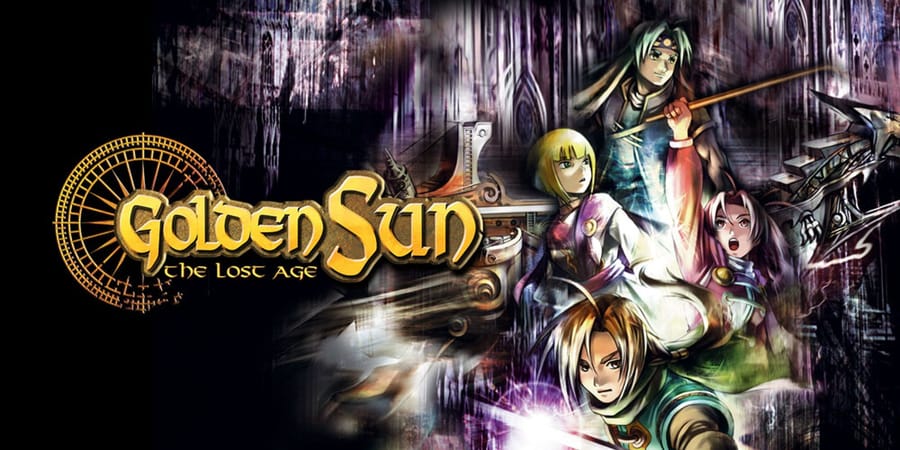Welcome back.
In my last (video game) column I discussed a video game that was promoted to me by Josh Strife Hayes – putting the number of video games I have tried on the ironclad recommendations of Youtubers to two.

Which isn’t a lot, but it is weird that it happened twice.
Golden Sun makes it very clear that the Lost Age (TLA) is a sequel – so, spoilers ahead.
I knew I wanted to play Golden Sun’s sequel before Josh did a video on it, because with these storybeat-heavy titles, you lose a certain amount of immersion letting someone else spell the plot out in its entirety before you play it.
But I digress.
At the end of Golden Sun our original intrepid heroes – Isaac, Garet, Ivan, and Mia – are unable to prevent the lighting of the Venus lighthouse, and defeat the big bads of the first game – Saturos and Menardi. Felix, Jenna, Sheba, and Kraden escape in the chaos.
In a role reversal that (initially) appears to be very clever, we pick up with Felix, Jenna, Sheba, and Kraden. Indeed, from the outset, we’ve got the makings of a continent-hopping adventure, not too dissimilar to the first.
And it almost immediately falls apart. In fact, if you wanted to stop reading my review right now, I will give you the cliff’s notes:
The Lost Age’s few mechanical gains are wasted on a story experience that is initially unfocussed, followed by an extremely mediocre payoff. Whilst I think for completeness’ sake, you should play and complete it – and the game’s dungeons are a particular high point - Golden Sun is by far the stronger experience.

As a direct comparison, Golden Sun gives the player a firm and immersive understanding of their role in the plot, and weaves the overarching narrative expertly through a series of local subplots. Isaac and Garet were attempting to rescue Felix and Jenna, and prevent the lighting of the Elemental Lighthouses. Simple, punchy, effective.
Along the way, the player was drawn through the story by a series of engaging local narratives required to progress through the world, one chunk at a time.
The sequel has local stories, but they don’t harmonize with the main plot. The game feels disjointed, sometimes aimless, and as is to be expected of a late-90s / early 00s JRPG, when you get stuck and forget how to move the plot forward, good luck.
As is to be expected of a sequel, The Lost Age does feature the same combat mechanics with Djinn, and Psyenergy, and the same satisfying feeling when it all clicks. Indeed, I stopped worrying about summoning, and barely used it in the same manner I had in the first game – which speaks to the depth on show. At least initially.
Not just that, but the level design and world exploration have been expanded upon. Reveal is still an all-star, along with mind read, which is an absolute boon for storytelling. New additions include Lash, Cyclone, and Scoop – all of which are useful, and see repeat implementations – a major strength of both games.
Indeed, if the Lost Age does have one strength, it is the dungeons are longer, more complex, and a ton of fun to play through – and they do this by constantly remixing ways to use abilities to progress through the game. Indeed, when it comes to level design, and challenging the player to be on alert for opportunities to use psyenergies, The Lost Age is truly groundbreaking, and something I haven’t experienced in a game – other than Golden Sun, anyway.

But then the gripes start.
Eventually, the party gains access to a boat. And whilst I’m sure the developers thought this allowed for a broadening of the game’s horizons, it instead removes the structure of a game that was already struggling to maintain a coherent throughline. The game devolves into something closer to a traditional 90s JRPG, and there are games that do a better job of that – as a random example, Chrono Trigger.
And as TLA’s world opens up thanks to its much-vaunted boat - which can even fly later on - the game’s story threads become convoluted and unclear. I did not need outside help to progress in Golden Sun, but I needed to lean on a guide for the sequel a lot. And just as I predicted, every time I had a snag in a plot thread and needed to look up the solution, my immersion and enjoyment of the game diminished.
Almost all my consultations of a walkthrough were after I got the boat. That is not a coincidence, and speaks to the poor structure and conveyance of The Lost Age.
A particular “how was I supposed to know that” moment occurs when you’re finding three pieces of a trident – something the game doesn’t articulate to you – the final location is located right down in the bottom of the map, on a long snowy island. At the far end of the island, which takes approximately thirty seconds to walk from right to left, is a story-critical location which contains the last trident piece you need.
How do you know it’s down there? You don’t!
Where I felt the game really gave me the middle finger was “The Reunion”, where you finally meet up with the party from the first game.
This moment has been alluded to for a game and a half – and what happens when the two meet?

Basically nothing – Isaac’s party believes Felix, despite their lived experiences, and everyone just hugs it out.
All that payoff, straight in the bin.

This event also marks the moment all challenge disappears from the game. Your party effectively doubles, and the previous limitations of the system disappear as you can have any combination of classes and characters you want. Initially your mind is blown with the possibilities, but then everyone becomes Samurai, Ninja, White Mage, or Dragoon, and the game becomes boring.
Then, in perhaps one of my least favourite design decisions, the developers allow some bosses to drain you of your djinn, completely invalidating the core mechanic of the series, to compensate.
Great job, gold star.
As I played, there was this overwhelming sense that the last third of the game was rushed. There’s a setup with one of the new villains, Alex. It’s heavily implied he will be the final boss, and he just… isn’t. Instead, the final boss is instead a dragon – again – and the whole game ends with an extremely contrived happily ever after.
I had high hopes for The Lost Age. In the digital triangle, Golden Sun is strong everywhere. But the sequel’s narrative elements are lacking, the reunion takes a complicated and rewarding RPG system and ruins it, and the exploration and dungeon components, whilst better, do not save what is a very disappointing experience.
You should still play the sequel for completeness’ sake – after all, it is a game in two parts – but if you’re anything like me, you might find yourself running out of gas, and thinking about doing something else.
Catch you next time,
Vulkan
Critical Information Summary
Review Platform: Nintendo 3DSXL (emulated)
Developer: Camelot
Publisher: Nintendo
Cost (At Time of Publish): Varies - second hand market only
Did you like this article? Did you hate it? Go over and keep the discussion going on the official Vulkan's Corner facebook page! - whilst you're at it, leave a like!

